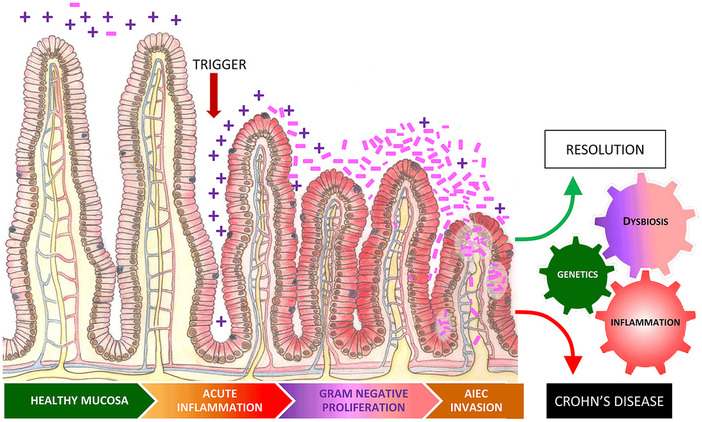Dysbiosis
Autoimmune diseases share one common bond, dysbiosis, also known as leaky gut syndrome. What occurs in leaky gut syndrome is the development of perforations of the intestinal lining or micro villi cells. The perforation is often the result of pathogenic bacterial overgrowth in the microbiota of the digestive tract.
In the above illustration, E-coli bacterial overgrow causes severe inflammation and perforations like that reported with Crohn's disease.
A damaged intestinal lining may result in pain, poor digestion and absorption, and leaking of improperly digested food proteins, toxins, and possibly microorganisms such as bacteria, viruses or yeast themselves. The food proteins, referred to as peptides, enter the blood stream and become targets of the immune system's antibodies. When in the bloodstream these displaced food particles and toxins are suspected of causing the inflammatory symptoms experienced by autoimmune disease sufferers.
When subsequently consumed, food proteins that previously entered the blood stream may be identified in the digestive system as a threat. The response to such a threat is more inflammation in the digestive tract and the development of a food intolerance/allergy.
The following study demonstrates how simple ingredients in processed food increases risk for developing dysbiosis.
In the above illustration, E-coli bacterial overgrow causes severe inflammation and perforations like that reported with Crohn's disease.
A damaged intestinal lining may result in pain, poor digestion and absorption, and leaking of improperly digested food proteins, toxins, and possibly microorganisms such as bacteria, viruses or yeast themselves. The food proteins, referred to as peptides, enter the blood stream and become targets of the immune system's antibodies. When in the bloodstream these displaced food particles and toxins are suspected of causing the inflammatory symptoms experienced by autoimmune disease sufferers.
When subsequently consumed, food proteins that previously entered the blood stream may be identified in the digestive system as a threat. The response to such a threat is more inflammation in the digestive tract and the development of a food intolerance/allergy.
The following study demonstrates how simple ingredients in processed food increases risk for developing dysbiosis.
Crohn's Disease-Associated Adherent-Invasive Escherichia coli Adhesion Is Enhanced by Exposure to the Ubiquitous Dietary Polysaccharide Maltodextrin
Kourtney P. Nickerson, Christine McDonald: DOI: 10.1371/journal.pone.0052132 Published: December 12, 2012
http://www.plosone.org/article/info%3Adoi%2F10.1371%2Fjournal.pone.0052132
Kourtney P. Nickerson, Christine McDonald: DOI: 10.1371/journal.pone.0052132 Published: December 12, 2012
http://www.plosone.org/article/info%3Adoi%2F10.1371%2Fjournal.pone.0052132

